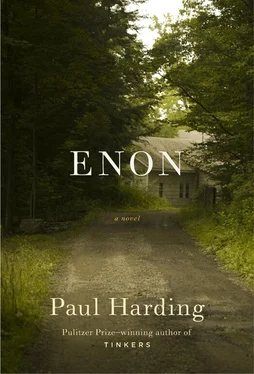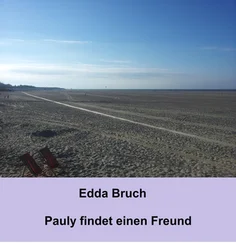Susan had been gone for more than a week. I wanted to call her, to hear her voice. The idea of hearing her became a little like being able to call Kate, wherever she was, and hear her voice and be comforted by it. But I didn’t call. Poking the numbers on the keypad and hearing the ring on the other end of the line and having Susan or Kate answer would have split something that had already begun to skin over. The idea of hearing Kate’s voice was already an instance of the kind of daydreams I’d begun to give myself over to. (What if there were to be a phone somewhere in the woods, a chthonic hotline made of dark horn, resting on a bone cradle, that patched me through to Kate in her urn?) Calling Susan seemed increasingly impossible, too, though, because after she said hello, after she had answered the phone, or her mother or father had, which, I thought, might even be worse — having to say hello to her mother, for example, and having to ask if she could get Susan to come to the phone, when maybe she wouldn’t, when maybe the phone call would even end with that, with her saying, “No, Charlie, I don’t think that would be good for Susan right now,” or something equally gentle and negative — after Susan had answered the phone, and there was that open sound coming over the handset, that white noise that old phones pick up from the ambient commotion of the planet, what would I say? What could I say? What word could I utter into that rushing silence that would change things, that would bring Susan back to Enon, that would bring Kate back to the both of us?
OUR HOUSE WAS RAMSHACKLE and had old plumbing that smelled ammoniac in hot weather and heating that clanked all night in the winter and ancient horsehair plaster on the walls that crumbled if you tried to tap a picture hanger into it. We’d bought it just after Kate’s third birthday, with help from my grandmother and my mother and some from Susan’s parents out in Minnesota as well. It consisted of two smaller structures, neither originally built on the site, joined end to end. The back part of the house had been a seamstress shop originally located a mile away, at the crossroad in West Enon, where two hundred years earlier it had stood facing a one-room schoolhouse and the long since demolished home of a man named Ebenezer Cross, who’d acted as the caretaker of the school. It had been constructed in 1798 and had low ceilings and small windows, and when we first moved in and I was poking around in the attic space above the kitchen, I pulled back some of the old lathing and found it insulated with crushed seashells and balled-up newspapers from 1807. The front part of our house had originally stood a mile away in the opposite direction, on the road north to Hillham. The man from whom we bought the house, a widower named Roberts, told us that the front part of the house had been built by a young husband for his wife and child — a young family like ours — in 1880. When they had raised a family of three boys and four girls and the husband and wife passed away, both within a month of each other, in 1950, the farmer who owned all the orchards around the property had the house moved to its present location, along with the old seamstress shop, which had belonged to one of his great-aunts. The front part of the house had high ceilings and tall, drafty windows that Susan and I both loved because they let in so much light. There were two rooms on the first floor — a dining room and a living room — and two bedrooms on the second floor. The two halves of the house were connected by a single low doorway between the kitchen in the old part and the dining room in the newer part.
Houses retain traces of the people who have lived in them and I feel those traces immediately whenever I step into one. When Susan and Kate and I looked at the few houses within our price range in Enon, there were times when my stomach soured and my head ached before I had walked through two rooms. A given house would seem like a repository of misery, a deliberate prison in which successions of families had huddled and cowered from one another for decades. It seemed criminal for the real estate agents to talk up such miserable wrecks, as if they could ever be homes again for reasonable, peaceable souls, as if they should not have been demolished and the land on which they stood rededicated in special, purgative ceremonies. The agitation I felt in those tomblike buildings felt like contagion, as if the frequency and amplitude of the woe vibrating through the boards and pipes and wires of the house immediately began to affect the synapses in my brain and interrupt the beat of my heart. Susan experienced this, too, and the two of us passed silly, exaggerated looks behind the real estate agent’s back as we allowed her to give us the complete tour, having agreed after the first time this had happened that we were too self-conscious to stop the agent short because the house had bad vibes. Susan would squinch her nose, as if she smelled turned milk; I’d hunch my shoulders and limp like Quasimodo; she’d put her hand to her mouth and nod a couple times, miming laughter; I’d raise a fist and tilt my head, roll my eyes back and loll my tongue, mimicking the hopeless father who had hanged himself in the basement.
KATE AND I SOMETIMES took walks along the Enon Canal. We reached the canal by a dirt access road that ran between my old friend Peter Lord’s house and the estate of a widow named Hale. I had met Mrs. Hale twice. The first time was when Pete and I were boys, maybe eleven or twelve, and had been sledding down the hill on her property, which was called Hale’s Hill and was the third-highest hill in the village, and the highest down which a sled could be run. We had not asked permission to be on her property. She must have seen us from one of the third-story windows of her mansion, just visible over the east slope of the hill. When we saw her marching across the deep snow toward us, we thought she was coming to scold us. Being brought up in Enon, neither of us had the inclination to run away. We were well used to taking scoldings from elderly women. Mrs. Hale was tiny, barely five feet, and as lean as rope.
When she was within a few yards of us she said, “You sled like girls.”
She reached us and grabbed Pete’s sled from him.
“This is how you do it,” she said. She dropped the sled, knelt, and lay belly down on it, face-first.
“Push,” she said. I leaned down and took the sled by the backs of its runners and inched it toward the brink of the hill.
“A real shove,” she said. “Shove me right down the thing.” So I gave her a heave and down she went. The snow was packed and hard where we’d been making our runs, so it was like an ice chute. Mrs. Hale went down the hill as fast as if she were on a luge. There was a swamp at the bottom, full of trees and shrubs, and we always bailed off our sleds before the ends of our runs, so that we would not be dashed against a tree or shredded up in the briars. Mrs. Hale must have seen us flopping off our sleds before we hit the swamp and been galled by it because, when she hit the bottom of the hill at near-Olympic speed, she simply rocketed ahead. We lost sight of her past the tree line, but we heard the racket of the sled as it clattered among the trunks and frozen tules. We ran after her, convinced that she lay broken and dead, headfirst among the bulrushes and alders. But before we were halfway down the hill, she staggered out of the swamp, dragging the sled behind her, hat askew. She stomped up to us and handed Pete the tether.
“ That is how you sled,” she said and limped away back to her big house behind the hill.
The second time I met Mrs. Hale I went to her house with my grandfather to fix one of her clocks. Her house was the sort about which I have always had dreams. Maybe hers is the house that prompted them.
Читать дальше












